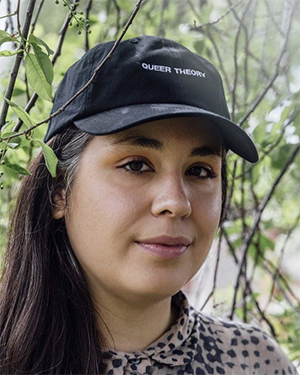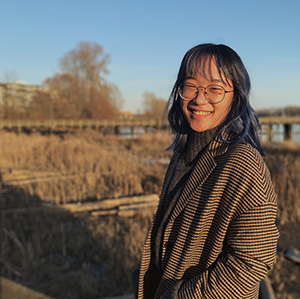Beyond the Page: Jiejun Wu in Conversation with Emily Riddle

Malahat Review volunteer Jiejun Wu talks with Emily Riddle, 2021 Constance Rooke Creative Nonfiction Prize contest judge and contributor to spring issue #214 with her essay "An Immodest Proposal: The Black Widow of Treaty 6." She discusses intertextuality, Indigenous governance, and instructs contest entrants to write about “something important that needs to change in the world.” Read an excerpt of "An Immodest Proposal" here.
Emily Riddle is nehiyaw and a member of the Alexander First Nation in Treaty 6. She lives in amiskwaciwâskahikan. A writer, public library worker and researcher, she sits on the board of advisers for the Yellowhead Institute, a First Nations-led think tank. Emily was shortlisted for the 2020 CBC Poetry Prize and selected for the 2021 Writers’ Trust of Canada mentorship program. Her first chapbook is forthcoming with Moon Jelly House. Her writing has been featured in The Globe and Mail, Teen Vogue, Briarpatch, and others. During the pandemic she spent a lot of time playing mario kart, trying to keep plants alive, and making kombucha. She is currently completing a poetry book and a queer time travel novel about the fur trade. [Photo credit: Zach Ayotte]
What are you looking for in a winning contest entry?
I am looking for creative nonfiction writing that is bold and unconcerned with form or conventions. I love creative nonfiction that asks me questions I cannot answer or parses out disparate histories or opinions. Tell me about something important that needs to change in the world.
In the opening of "An Immodest Proposal," you explain that "[i]t has taken twenty-nine years of my life to assemble the story of my father's parents' marriage and separation." Stories, you acknowledge, are "living and ever-changing," and that to "think otherwise is a fallacy of the Western world." How did you approach writing a story that is still being "assembled," and why did you choose to write this particular story now?
Since this is an essay about my family, it is one that continues and changes. It has changed since it was printed. I think within nehiyaw thought, even fiction characters live on beyond pages because they live in the minds of the writer and readers. They have their own spirit. I wrote this piece with the recognition that this is my point of view only and that there are others that exist on these events, and other views of the situations discussed. I feel like I did not entirely choose to write this piece. It poured out of me one night all in one go and has been edited over the past few years until I felt brave enough to publish it.
The title of the piece draws on Jonathan Swift’s 1729 satirical essay, “A Modest Proposal,” and the footnotes within the essay reference figures like bell hooks and Arthur Manuel. Can you speak to this intertextuality and why it was important to situate this story in relation to these writers?
“A Modest Proposal” is a satirical essay I was required to read many times in school and I really connected with it. It was one the few explicitly anti-imperialist pieces that I remember reading, one that spoke about the ruling class. The essay suggests that Irish people might consider selling their children as food in efforts to improve their economic condition. “An Immodest Proposal” has a satirical twist as well, which is inspired by “A Modest Proposal.” We know the poverty in Ireland at the time was the result of English imperialism. My dad’s side of the family is mostly Celtic and Scandanavian. English imperialism was a reality for both sides of my family, and still that does not diminish the role of my white ancestors in the occupation of my homelands here. It’s complex and something I seek to continue to unravel in my writing. I think many Indigenous writers shy away from writing about their white ancestors.
bell hooks’ work is another major influence. I read All About Love so many times in my early twenties and the difference between love and care is something that I’m still constantly ruminating on. Her work is in response to Frantz Fanon’s writings on love in Black Skin, White Masks and both these thinkers have brought forth such important commentary on the politics of love and sex.
Arthur Manuel’s writing and organizing continues to be influential in Indigenous thought and politics to a large extent. The notion that we are only in control of 0.2 percent of the landmass of Canada is so daunting. If our writing as Indigenous people does not advocate for land back, then what are we doing?
In addition to being a writer, you are also a researcher, policy analyst, and library worker. How, if it all, do these different aspects of your professional life inform and influence your writing?
I think my background in working in Indigenous governance informs all of my work deeply. Governance is ultimately about how we relate to one another. I have spent time learning about how nehiyaw governance systems used to work and how they have been eroded. I think there is important change to be made in all these realms from canlit, to libraries, to policy. I like inhabiting all these spaces and talking to people to see how we can bring Indigenous processes and ways of knowing to them. I also think creative writing has helped me heal from the boundaries and limitations of policy writing. Within Indigenous policy, we are largely working in settler structures and trying to make the best inside them. In creative writing, I can make an entirely new world, experiment with form, and crack jokes.
What other writing projects are you currently working on?
I am currently finishing a poetry collection through a Writers Trust mentorship program with Joshua Whitehead. I am very grateful for Josh's help in completing the manuscript because I admire his work so much as someone who works in multiple forms and who knows deeply that nehiyawak are complex and beautiful people. The poetry manuscript is about nehiyaw women’s role in governance, intimacy as politics, and our relationships with ancestors in non-linear timescapes.
I also have a very embryonic novel project that I am currently completing research for. It is a time travel trilogy with characters travelling from the peak of the fur trade at Fort Edmonton to a post-pandemic Treaty 6 Territory. It includes some of my ancestors as characters and includes a queer retelling of that era so it requires care both in ensuring historical and cultural facts are correct, but also in continuing relations with those in our communities who have this knowledge.
I am also always working on essays, personal ones and journalistic work too. I like working in multiple forms and to have my fingers in a bunch of projects at once.

Jiejun Wu
* * * * * * * *









